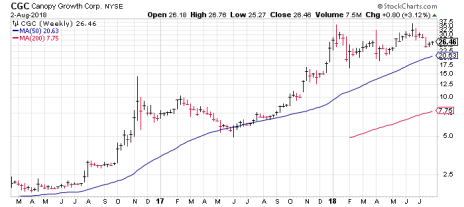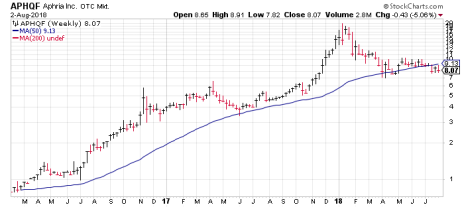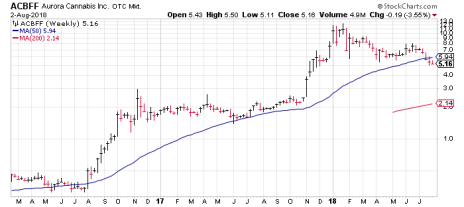Every investor who looks into investing in marijuana stocks finds the big three Canadian growers first.
Canopy Growth (CGC)
Aphria (APHQF)
Aurora (ACBFF)
And many investors buy these stocks, because these companies are growing fast (no pun intended) and they have a very visible pathway to earnings—eventually.
But what many investors fail to realize is that as all those Canadian growers (as well as the smaller growers) ramp up production in the years ahead, the market may become saturated with marijuana.
Marijuana, after all, is a commodity, no less difficult to grow than corn or wheat. (There’s a reason it’s called “weed”.)
And what happens when the supply of a commodity grows faster than demand?
[text_ad use_post='137724']
Prices plummet—and investors in the stocks of the companies that make that commodity lose a lot of money!
I’ve seen it happen over and over in this country with wheat and corn and oil—among other commodities—and there’s no reason to believe it won’t happen with marijuana.
So I’ve been extra careful to ensure that the readers of Cabot Marijuana Investor diversify into other areas of the marijuana industry—and not get over-weighted in growers.
Other Ways of Investing in Marijuana Stocks
For example, you may have read recently that GW Pharmaceuticals (GWPH) got the nod for FDA approval of Epidiolex, its cannabis-derived treatment for infant and childhood epilepsy. Because Epidiolex is classified as an orphan drug, GW will be able to charge as much as $40,000 for a year’s treatment!
Trouble is, a lot of people read that news, which is one reason the stock is trading at 134 as I write.
But I’ve got a Canadian company that’s done similar work with cannabis-derived medicines, and also successfully treated children with epilepsy—and its stock is trading at just 23.
More important, very few investors even know about this stock; it just came public in July!
You can read about this company in my next issue of Cabot Marijuana Investor—and learn why a year from now this stock could easily be double its current value.
Also, you’ve no doubt heard how hard it is for marijuana companies to deal with banks in the U.S. As a result, it’s difficult for them to buy real estate. Which is a perfect opportunity for a well-managed Real Estate Investment Trust (REIT) to step up to corner the business.
The best marijuana REIT has been in my portfolio since November, and my readers already have a 70% profit!
Furthermore, the future for this company is very bright, so I’m planning to give my readers a full update in my next issue—coming out later this month.
And then there’s the huge potential of the CBD business. CBD stands for cannabidiol, the part of cannabis that doesn’t get you high, but does provide a wide range of therapeutic benefits. (Proponents recommend it for everything from insomnia to arthritis to anxiety to menstrual cramps to diabetes.)
There are a lot of companies working to get into the CBD business, but my favorite is the leader, the top-selling brand of hemp oil in the U.S.
So there you have it.
A treatment for epilepsy, a marijuana REIT, and the top-selling brand of hemp-derived CBD.
All are attractive alternatives to “traditional” ways of investing in marijuana stocks for if and when marijuana prices collapse. And you can read about all three in the next issue of Cabot Marijuana Investor, which will be published at the end of this month.
[author_ad]




